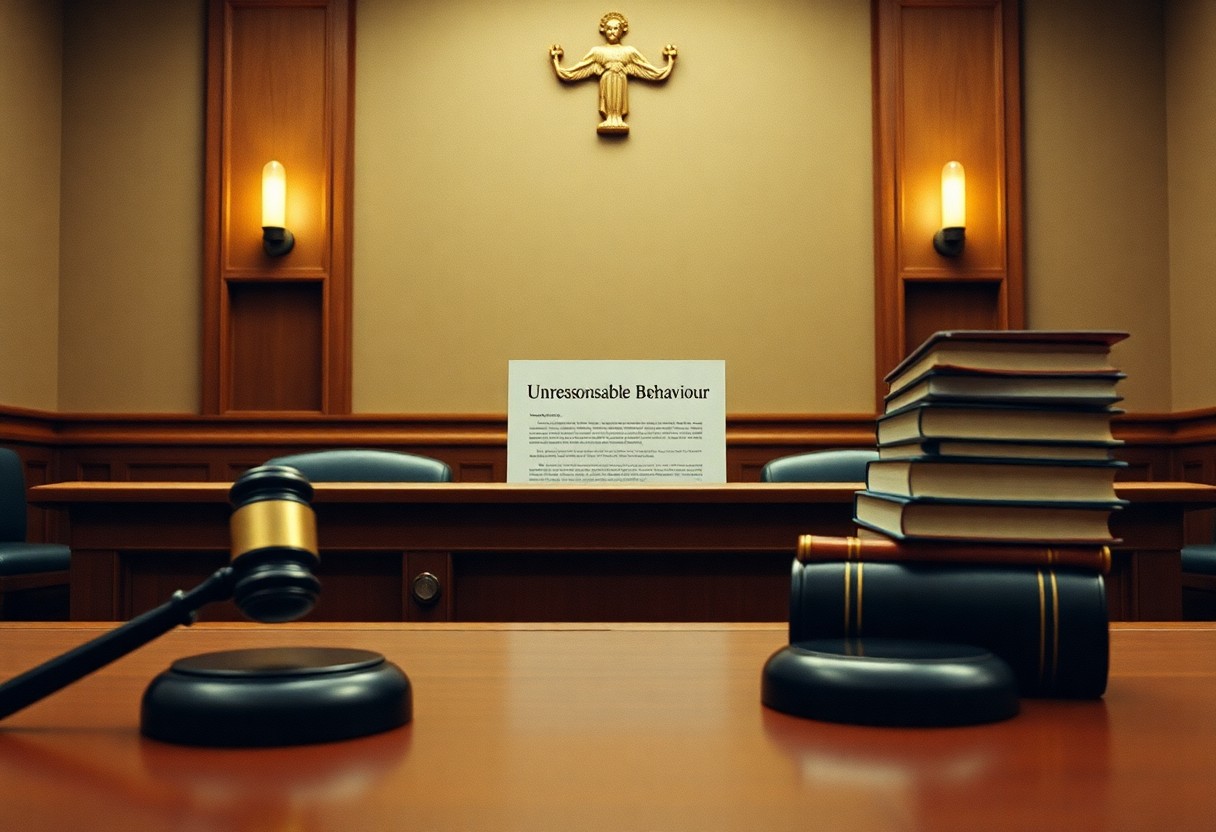Many individuals facing divorce may grapple with the concept of unreasonable behaviour as grounds for their separation. Understanding what constitutes unreasonable behaviour is vital for you, as it can significantly affect your rights and the outcome of your case. Actions such as emotional abuse, financial irresponsibility, or infidelity can be considered unreasonable, but it’s important to know that not all negative behaviour meets this legal threshold. Familiarizing yourself with these definitions will empower you in navigating your divorce more effectively.
Divorce can be a complex process, and understanding what constitutes unreasonable behaviour in your case is vital. This term refers to actions that make it intolerable for you to continue living with your spouse, encompassing both emotional and physical abuse, neglect, or deceit. Common examples include verbal abuse, unfaithfulness, or financial control. Recognizing these behaviours can help you build a strong case if you’re seeking a divorce on these grounds.

Key Takeaways:
- Unreasonable behavior includes any actions that cause significant distress to a spouse.
- Examples include emotional abuse, financial irresponsibility, or refusal to communicate.
- Physical violence or threats are clear indicators of unreasonable behavior.
- Excessive jealousy or controlling behavior can contribute to claims of unreasonable behavior.
- Abandonment or neglect of responsibilities also qualifies as unreasonable behavior.
- Unreasonable behavior must be demonstrated to have affected the relationship adversely.
- Each case is judged on its individual merits and context of the behavior.

Key Takeaways:
- Unreasonable behaviour includes physical or emotional abuse.
- Verbal abuse and harassment qualify as unreasonable behaviour.
- Neglecting financial responsibilities can be deemed unreasonable.
- Refusing to communicate or cooperate in the relationship is a factor.
- Excessive jealousy or controlling behaviour may be considered unreasonable.
- Substance abuse impacting the marriage can count as unreasonable behaviour.
- Disregarding the needs of the spouse or children could be classified as unreasonable.

Defining the Boundaries of Unreasonable Behaviour
Establishing what constitutes unreasonable behaviour requires a nuanced understanding of specific actions and their impact on the marital relationship. Unreasonable behaviour is not limited to physical actions; it encompasses emotional neglect, psychological manipulation, and any behaviour that significantly disrupts marital harmony. Each case varies, indicating that what’s unacceptable in one relationship may not be perceived the same way in another, emphasizing the need for clear boundaries to guide legal outcomes.
Legal Criteria for Unreasonable Behaviour in Divorce
In legal proceedings, unreasonable behaviour must meet defined criteria to be substantiated effectively. Courts assess the evidence based on its capacity to show that one spouse’s conduct is damaging, unreasonable, and has led to the breakdown of the marriage. This can include instances of excessive criticism, violence, or coercive control. The overall impact of these actions on your well-being and the overall marital relationship plays a key role in determining the validity of the claims.
The Role of Jurisdiction in Defining Unreasonable Behaviour
Your jurisdiction significantly influences how unreasonable behaviour is interpreted and applied in divorce cases. Different legal systems have varying standards and definitions, leading to potential discrepancies in outcomes. The local laws dictate the types of evidence required and the overall process for proving unreasonable behaviour, which can impact your case significantly.
For instance, in England and Wales, the Divorce Act allows for unreasonable behaviour as a ground for divorce, but the specifics of what qualifies can differ from other regions. In some jurisdictions, behaviours deemed unacceptable may vary in severity; for example, financial irresponsibility may be viewed more seriously in a region with strict financial disclosure laws. Understanding these nuances is vital for crafting a strong case tailored to your jurisdiction’s legal landscape. Seeking local legal guidance can provide clarity on how to navigate these differences effectively.

Defining Unreasonable Behaviour: The Legal Framework
The legal framework surrounding unreasonable behaviour in divorce cases offers a structured approach to understanding what constitutes such behavior. Defined by the Matrimonial Causes Act 1973, unreasonable behaviour involves actions that you find intolerable, thus making it impossible for you to live with your spouse. This legal definition does not necessitate physical abuse; rather, it broadens the scope to include emotional and mental distress.
Statutory Definitions and Criteria
The statutory criteria for unreasonable behaviour require you to substantiate your claims with specific examples and details. Courts typically assess the severity and frequency of behaviours described in your petition, ensuring they genuinely impact your wellbeing. Judgments take into account the context of marital dynamics, making it important to present a clear narrative of your experiences.
Judicial Precedents and Interpretations
Judicial precedents play a vital role in shaping how unreasonable behaviour is interpreted in court. Cases such as Coldham v Coldham (1995) highlight that what may seem trivial can be significant in the context of your marital relationship. Courts have consistently ruled that patterns of disregard for your emotional needs can qualify as unreasonable behaviour.
In previous rulings, judges have emphasized that the concept of unreasonable behaviour is subjective, influenced by individual circumstances and the nature of your relationship. For instance, in the case of S v S (2018), the court recognized that constant criticism and lack of support could cause significant emotional strain, even without overt acts of hostility. As such, each case is uniquely assessed, allowing a broader interpretation that can significantly affect the outcome of your divorce proceedings.

Emotional and Psychological Dimensions of Unreasonable Behaviour
Emotional and psychological dimensions of unreasonable behaviour can significantly impact divorce proceedings. Behaviours that manifest as intimidation, manipulation, or controlling actions often create a toxic environment, making it difficult for you to navigate the separation process effectively. Understanding these dimensions not only sheds light on your experiences but also lays the groundwork for establishing your case in court.
The Impact of Emotional Abuse on Divorce Proceedings
Emotional abuse can deeply affect the dynamics of divorce. You might experience feelings of worthlessness, anxiety, or isolation due to your partner’s actions. These feelings can hinder your ability to make sound decisions or present your case convincingly, often complicating custody, asset division, and support matters. Courts increasingly recognize the implications of emotional abuse, validating your experiences as serious and relevant in divorce cases.
Recognizing Psychological Manipulation as Unreasonable Behaviour
Psychological manipulation often involves tactics like gaslighting, where your perception is twisted to create doubt and confusion. This undermines your self-esteem and makes it challenging to assert your needs and boundaries. If your partner uses guilt, blame, or emotional blackmail to control situations, these behaviours clearly fall under the umbrella of unreasonable behaviour in divorce.
Identifying psychological manipulation in your relationship is necessary for building a strong case in divorce proceedings. Tactics such as persistent guilt-tripping, passive-aggressive comments, or creating false narratives undermine your sense of reality and self-worth. Keeping a record of instances when manipulation occurs can provide concrete evidence during divorce proceedings, showing the court how these behaviours have affected your emotional state and overall well-being. Such documentation not only reinforces your claims but also helps clarify the impact of these actions on your life and your children’s future.
Common Examples of Unreasonable Behaviour in Divorce
Unreasonable behavior in divorce cases often manifests in various forms, each contributing to a toxic environment within the marriage. Common examples include persistent criticism, lack of communication, extreme jealousy, and neglect. These actions can lead to emotional distress, making it unbearable for one partner to remain in the relationship. Understanding these behaviors can clarify your position in a divorce, underscoring the impact on your mental and emotional health.
Emotional and Psychological Abuse
Emotional and psychological abuse can severely destabilize your wellbeing, characterized by manipulation, intimidation, or verbal attacks. This abuse often leads to feelings of worthlessness and isolation, shaping a toxic marital dynamic. Constant belittlement or threats can create a pervasive atmosphere of fear, making it impossible for you to function normally within the relationship.
Financial Misconduct and Deceit
Financial misconduct includes any deception around finances, such as hiding assets or accruing debts without your knowledge. This behavior undermines trust and stability in the marriage, often leading to significant economic disadvantages for one spouse. In divorce proceedings, proving financial misconduct can strengthen your case and ensure fair distribution of shared resources.
Common forms of financial misconduct include secretly draining joint accounts, failing to disclose income or bonuses, and incurring debts under your name without consent. In some cases, one partner may engage in gambling or spending sprees, leaving the other unaware until it impacts the family’s financial security. Courts often view these actions seriously, as they reflect a lack of transparency and responsibility, key factors in determining asset division during divorce. Addressing these issues can help safeguard your financial future post-divorce.

Financial Implications of Unreasonable Behaviour
Unreasonable behaviour can create significant financial implications during divorce proceedings. Often, the conduct of one party may entitle the other to a larger share of the marital assets or affect spousal support determinations. Courts assess how such behaviour impacted your financial standing and contributing welfare, sometimes even considering compensatory payments to address long-term financial disadvantages caused by the unreasonable conduct.
Examining Economic Abuse in Divorce Cases
Earnings and access to finances can be severely impacted by economic abuse, which often intertwines with unreasonable behaviour. This form of abuse restricts your ability to earn or manage money freely, potentially leading to significant financial hardship. If you have faced limitations on your financial independence, it may reflect negatively on your former partner, influencing the court’s perception of asset division and settlements during your divorce.
How Financial Manipulation Affects Divorce Settlements
Financial manipulation during marriage can severely distort the realities of asset division in a divorce. If one party has isolated you financially, it may result in an inequitable distribution of property or assets. Reconstructing documents, concealed income, or misrepresented financial accounts can undermine equitable settlements and create lasting repercussions in your financial future.
For instance, a spouse who underreports income or engages in deceptive practices may prevent you from receiving your fair share of joint assets. This manipulation could include hiding assets in offshore accounts or presenting false valuations of properties. Courts often scrutinize financial disclosures after discovering such deceit, leading to revised settlements and potential sanctions for the hiding party, ensuring you receive equitable relief from the financial fallout of their untrustworthy actions.
The Impact of Unreasonable Behaviour on Divorce Proceedings
Unreasonable behaviour significantly influences divorce proceedings, potentially complicating the process. Courts often scrutinize the specifics of your claims, requiring substantial evidence to substantiate allegations. These claims can affect timelines, leading to prolonged negotiations and heightened emotions, which may delay your final decree. Establishing a clear pattern of unreasonable conduct can bolster your case, but failed claims may also weaken your position in discussions around asset division and custody.
Grounds for Divorce: Legal Implications
Your grounds for divorce under unreasonable behaviour must satisfy legal requirements, with specific types of conduct detailed in your petition. Allegations like abuse, emotional manipulation, or neglect can serve as valid grounds, but they must be sufficiently proven. The court evaluates whether the behaviour rendered cohabitation intolerable, which ultimately influences the court’s stance on divorce outcomes.
Effects on Asset Division and Custody Decisions
Allegations of unreasonable conduct can sway decisions on asset division and custody arrangements. Evidence of significant wrongdoing, such as financial misconduct or abuse, can lead to a more favorable settlement regarding asset allocation. Similarly, courts may take into account the behaviour’s impact on children when determining custody, favouring the well-being of minors and potentially altering parental rights.
In asset division, the court considers the conduct when evaluating contributions to the marriage. For instance, if one spouse’s unreasonable behaviour involved financial irresponsibility, you could argue for a greater share of the assets. In custody hearings, demonstrating how your partner’s unreasonable actions negatively affected the children’s environment can significantly impact the judge’s decision, prioritizing their emotional and physical security. Each case highlights the importance of compiled evidence and a solid strategy, ensuring the best outcome in your divorce proceedings.
Proving Unreasonable Behaviour in Court
Proving unreasonable behaviour in court requires a clear presentation of specific incidents that illustrate a breakdown of the marital relationship. You must provide the judge with a compelling account of how your spouse’s actions have negatively impacted your well-being or the marriage itself. This can include documented evidence, witness testimonies, or descriptions of patterns of conduct that demonstrate an intolerable situation. The aim is to establish a narrative that convincingly illustrates why reconciliation is not viable.
Collecting Evidence: What You Need to Support Your Claims
Gathering evidence is vital in substantiating your claims of unreasonable behaviour. Essential documents include text messages, emails, photographs, and any other communication that reflects the inappropriate conduct. Witness statements from friends, family, or professionals can enhance your case by providing external perspectives on your spouse’s behaviour. Additionally, keeping a detailed journal of significant events can help in providing a chronological account of the unreasonable actions.
Navigating the Legal Process: Strategies for Effective Representation
Effective representation during divorce proceedings involving unreasonable behaviour requires strategic planning and clear communication with your legal advisor. You should actively participate in developing your case by collaborating closely with your attorney, ensuring that they understand the nuances of your situation. Creating a comprehensive timeline of events, coupled with evidence, can make a compelling argument in court. Regular updates with your lawyer will help refine your strategy and prepare you for potential counterarguments from your spouse’s legal team.
Establishing a strong partnership with your attorney is key. Discuss details about your spouse’s behaviour openly, and don’t hesitate to share all relevant instances, as these can provide imperative context for your case. Understanding the possible outcomes of your case and preparing for both settlement discussions and court appearances can help you maintain focus and clarity throughout this challenging process. Staying organised with your evidence and timeline will aid your lawyer in crafting the strongest representation possible.
Navigating the Process: Gathering Evidence and Documentation
Gathering adequate evidence and documentation is fundamental in proving unreasonable behaviour during divorce proceedings. Collecting a range of materials will reinforce your claims and present a comprehensive picture of the issues faced throughout the marriage. This process not only aids in legal proceedings but also prepares you emotionally for the journey ahead.
Types of Evidence to Support Claims
To substantiate your claims of unreasonable behaviour, consider gathering the following evidence:
- Written Correspondence: Emails, texts, or letters that showcase the behaviour.
- Witness Statements: Testimonials from friends or family who observed the behaviour.
- Medical Reports: Documentation of any physical or psychological impacts.
- Photographic Evidence: Images demonstrating harm or distress caused.
- Financial Records: Proof of any financial abuse or mismanagement.
Thou must ensure all gathered evidence is organized and accessible for your legal representation.
Best Practices for Documenting Unreasonable Behaviour
Effective documentation requires an objective and detailed approach. Keep a journal noting incidents of unreasonable behaviour, including dates, times, and specifics. This record will serve as a vital reference during your case. Additionally, maintain a filing system for all physical evidence, ensuring everything is preserved in its original form.
Use a combination of direct observations and supporting evidence to create a robust narrative. For instance, detail each incident of unreasonable behaviour while cross-referencing with medical reports detailing emotional distress. Consistently document your experiences over time, capturing patterns that illustrate the gravity of the situation. Providing a consistent timeline not only strengthens your case but facilitates a clearer understanding of the progression of unreasonable behaviour in your marriage.
Changing Perspectives: How Society Views Unreasonable Behaviour
Societal attitudes toward unreasonable behaviour in divorce have evolved significantly over recent years. What was once seen as a personal failing is increasingly recognized as a complex interplay of emotional and psychological factors. You may find that friends, family, and communities are more supportive of individuals claiming unreasonable behaviour, reflecting a broader understanding of domestic dynamics and mental health.
Cultural Influences on Perceptions of Unreasonable Behaviour in Divorce
Your cultural background shapes how unreasonable behaviour is defined and perceived during a divorce. In some cultures, traditional views may stigmatize certain behaviours, while others may provide a more liberal perspective, normalizing actions that lead to higher divorce rates. Understanding these nuances can help you navigate personal expectations and societal pressures.
The Role of Public Opinion in Shaping Divorce Outcomes
Public opinion significantly influences how cases of unreasonable behaviour are viewed and handled. Your experience during a divorce can be impacted not just by legal considerations but also by the prevailing attitudes within your community. These collective beliefs can affect settlement outcomes and influence the emotional weight of personal accusations.
Shifts in public opinion can dictate the success of individual divorce cases. For instance, a rise in support for mental health awareness may mean that accusations of emotional abuse in your situation are taken more seriously than in the past. In some cases, this has led to more favorable outcomes for those asserting claims of unreasonable behaviour, as they receive empathy and understanding rather than judgment. The growing acceptance of divorce itself can also empower individuals like you to pursue legal action without facing as much social stigma, ultimately influencing the overall process and results.
Shifting Perspectives: Moving Beyond Labels in Divorce
Challenging traditional views of divorce involves recognizing that labels like “unreasonable” can obscure the complex human emotions at play. By shifting your perspective, you can focus on understanding underlying issues rather than assigning blame. This approach encourages collaboration and supports healthier outcomes for both partners and any children involved, ultimately fostering a more constructive dialogue during this painful transition.
Understanding the Emotional Toll on Families
The emotional turmoil stemming from divorce profoundly impacts family dynamics. Children often bear the brunt of confrontations and changes in stability, which can lead to anxiety and behavioral issues. Parents feeling trapped in tension may find it hard to provide the support and attention their kids need, further perpetuating a cycle of distress and resentment.
Redefining the Narrative: From Conflict to Resolution
Transforming the conversation around divorce can lead to resolution rather than prolonged conflict. By embracing open communication and mutual understanding, you can create an environment where collaborative problem-solving thrives. This shift allows for the exploration of shared needs and goals, paving the way for fair agreements and fostering a more amicable separation process.
Promoting dialogue rather than discord enables you to uncover common ground, which is imperative for effective co-parenting. Engaging in mediation or therapy can help facilitate these discussions, focusing on interests rather than positions. Studies show that couples who prioritize cooperative solutions often experience less emotional stress throughout the divorce, leading to healthier relationships post-separation. By redefining your narrative, you position yourself for a more positive outcome amidst the challenges of divorce.
Conclusion
On the whole, unreasonable behaviour in divorce cases encompasses actions that significantly impact your relationship’s foundation. This can include emotional abuse, ongoing deceit, or refusal to support each other’s wellbeing. When considering your situation, it’s necessary to evaluate how these behaviours affect your marriage’s dynamics and your ability to maintain a respectful partnership. Documenting specific incidents will strengthen your case, providing clarity and context should you choose to proceed legally. Ultimately, understanding the nuances of unreasonable behaviour can guide you in making informed decisions throughout this challenging process.
Conclusion
With these considerations, you should recognize that unreasonable behavior in divorce cases encompasses actions that significantly undermine the marriage’s foundation, such as emotional abuse, excessive criticism, or refusal to communicate. Identifying these behaviors helps you understand your rights and options during the divorce process. It is vital to gather evidence and consult with a legal professional to navigate your specific situation effectively. Addressing unreasonable behavior appropriately can influence the outcomes regarding custody, asset distribution, and overall settlement.
FAQ
Q: What counts as unreasonable behaviour in divorce cases?
A: Unreasonable behaviour refers to conduct that makes it intolerable for one spouse to continue living with the other. This may include emotional abuse, persistent arguments, or lack of support.
Q: Can financial issues be considered unreasonable behaviour?
A: Yes, if one partner consistently fails to contribute financially, hides assets, or incurs substantial debt without consent, this may be deemed unreasonable behaviour.
Q: Is infidelity considered unreasonable behaviour?
A: Yes, infidelity or any form of betrayal, including emotional affairs, is typically classified as unreasonable behaviour within divorce proceedings.
Q: How does substance abuse impact claims of unreasonable behaviour?
A: Substance abuse that leads to irresponsible behaviour, including neglect or aggression, can serve as a basis for unreasonable behaviour in divorce cases.
Q: Does neglecting household responsibilities count as unreasonable behaviour?
A: Yes, if one partner fails to fulfill their obligations in managing the household or caring for children, it may be viewed as unreasonable behaviour.
Q: Can mental cruelty be classified as unreasonable behaviour?
A: Yes, mental cruelty, including intimidation, threats, or isolation, is recognized as unreasonable behaviour that can justify a divorce.
Q: Are threats of violence considered unreasonable behaviour?
A: Yes, any threats or acts of violence constitute unreasonable behaviour and are taken very seriously in divorce cases.
